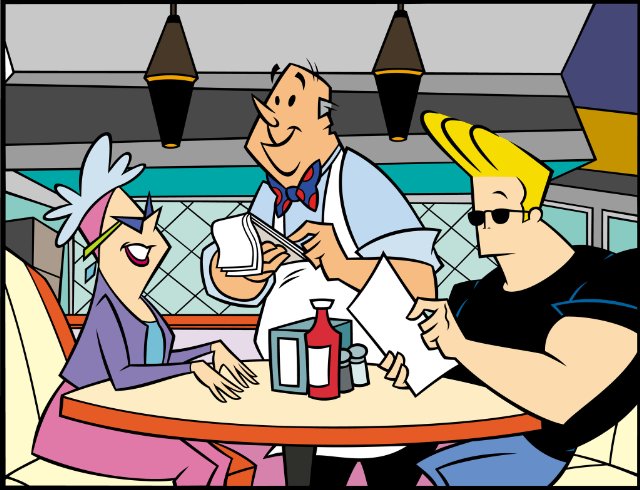“Johnny Bravo” Created by Van Partible; Written by Van Partible, Gene Grillo, Jed Spingarn, John Crane, Paul F. Kozlowski, Steve Marmel, Buch Hartman, Craig Bartlett, Craig Lewis, and Seth Macfarlane; Directed by Van Partible, Kirk Tingblad, Russell Calabrese, Robert Alvarez, Nathan Chew, John Mcintyre, Rumen Petkov, Butch Hartman, James Tim Walker; Starring Jeff Bennett, Brenda Vaccaro, Mae Whitman, Tom Kenny, Larry Drake, and Maurice LaMarche; Originally aired July 14, 1997; Run time 23 minutes.

“Johnny Bravo” was born in 1993 as part of creator Van Partible’s senior thesis project at Loyola Marymount University. At that time it was titled “Mess O’ Blues” and was about an Elvis impersonator. Partible’s animation professor took the animated short and showed it to a friend at Hannah-Barbera, the studio then asked Partible to develop the idea into a pitch for a new short. Partible revised the character’s style, changed the name, and hired Jeff Benett to provide the voice. Along with a small team of animators Partible created a new short which aired on Cartoon Network’s “World Premiere Toons” on March 26, 1995. Due to positive reception the concept was picked up for a full season and helped to launch a number of creators career’s including Seth MacFarlane who went on to create “Family Guy” among other things, and Butch Hartman who went on to create “The Fairly OddParents.”
The series lasted four seasons and had some minor to tone and style during the middle two years before reverting to its original style for its final run. The show follows the titular character through various macho endeavors, most commonly the pursuit of women. Despite Bravo being “pretty” his attempts at swooning the fairer sex rarely end well for him.
The series was generally well received and despite ending more than a decade ago it remains in the public consciousness proving the longevity of the character. There has been some debate about whether or not the series is appropriate for children and whether it provides a positive viewing experience. While there are some veiled sexual jokes strewn throughout the series, that hasn’t been the major source of contention. Concern surrounds the central character’s portrayal of a misogynist who views women only as bedpost marks.
Personally, my own perception of the series was not that Johnny’s actions were to be emulated, but that they showed an example of how not to interact with romantic interests. His overbearing actions always keep his interests at an arm’s length and the women almost universally reject him despite his confidence and good looks. To my mind this suggests to young viewers not only that these types of actions won’t be tolerated, so they aren’t worth pursuing, but also that if on the receiving end, they can and should be rejected, that confidence and good looks aren’t, and shouldn’t be, all that is required from a companion.
While viewers do empathize with the character, that empathy stems from his being the butt of the joke, his unwavering confidence in the face of continued failure, and the clear implication that his actions, while inappropriate, are not malicious. Further evidence of this comes from the episode entitled “Witch-ay Woman” wherein Johhny approaches a fortune teller. Unimpressed with Johnny’s attempts to woo her, the fortune teller uses the mystical arts to transform Johnny into a woman until he understands the effect his behavior has on those around him. Through a series of missteps Johnny ultimately experiences the constant objectification of women at the hands of himself and others like him and learns that there are more to women than superficial qualities.
This, at least to me, shows that the creators had a clear opinion on his actions and it wasn’t favorable, though mileage may vary, viewers will use their own judgement when watching the show and deciding to share with their children. Common Sense Media suggests using the of the show to launch discussions with kids about whether or not the character is an example of a good role model and whether his behavior is acceptable or good. While the show seems shallow and vapid on the surface, and for the most part is simply gag comedy, in this regard the show rises above some others of that era in offering some substance and sparking some conversation.
On the topic of “Johhny Bravo” controversy, I also came across a suggestion that the creators predicted the 9/11 attacks that sent me down a whole other rabbit hole that I won’t get into here. Suffice it to say, I’m fairly confident that the government did not attempt to cover up a terrorist plot and were subverted by a wily animator for “Johhny Bravo.” But maybe that’s just what they want us to think!